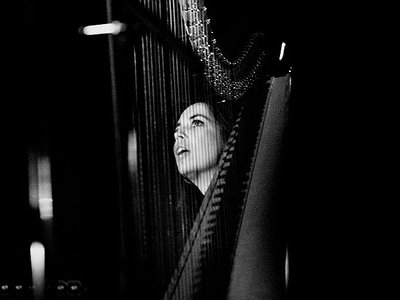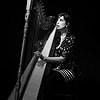Part 2
Could you take us through a day in your life, from a possible morning routine through to your work? Do you have a fixed schedule? How do music and other aspects of your life feed back into each other - do you separate them or instead try to make them blend seamlessly?
My daily life is pretty changeable. I travel a lot which is totally disruptive so when I’m at home I tend to be very organized to counter balance the chaos of touring.
I get up early and plan my day in hour long chunks. I usually have a few things I have to do each day like teach, rehearse, take a lesson, or make a recording. I try to practice a few hours every day and also write. Writing is the hard part so I always put it off as long as possible and so it always happens at night. I have a couple of new instruments I’m working on these days and since practicing is my favourite way to spend my time I do that first. The afternoon is when I usually teach/rehearse and do my admin work. Then I get stressed out from doing that stuff so practice for another hour. At night I finally dig into what I’ve been mentally prepping myself for all day which is writing/improvising. I can’t settle into writing unless I feel like all my other “homework” is done.
Night is a good time for my creative brain too. The buzzing thoughts of the day start to fade and if I have a lot of time to write I can use music to process some of the day’s experiences.
Could you describe your creative process on the basis of a piece or album that's particularly dear to you, please? Where did the ideas come from, how were they transformed in your mind, what did you start with and how do you refine these beginnings into the finished work of art?
My solo harp album Dose Curves is the work I’ve definitely put the most of myself into. The piece I’m happiest with on the album is "Ephemeris Data".
I had a clear intention with that piece. I wanted to write something to show off my instrument and be as stereotypically harpy as I possibly could. That’s tough to do without being really cheesy or new-agey and I’m glad with the way it turned out. It’s the piece I have the easiest relationship with because I take the least responsibility for it. I just sat down at my harp, imagined what the instrument sounds like to other people and started moving my fingers really fast. To me, it was written by my hands and instrument more than my brain. I just tried prodding it in different directions anywhere it felt like it was stagnating.
It didn’t change too much from when I first started playing it and the finished piece. I wrote the beginning and part of the second half in one sitting and the rest the next time I played it. That piece also really captures an accumulation of work with pickups, amps and pedals. It was waiting to come out and my fingers just played it.
There are many descriptions of the ideal state of mind for being creative. What is it like for you? What supports this ideal state of mind and what are distractions? Are there strategies to enter into this state more easily?
I have to feel very relaxed to create. Not necessarily happy but relaxed. Even if I’m channelling a lot of aggression I still have to feel relaxed in my body. I don’t do anything special to achieve that state. I used to be a lot more careful about diet, exercise and meditation to try to optimize mental and physical health. But that often had the opposite effect on me creatively. Any part of my life that imposes too much discipline or rigidity tends to get in the way when it’s time to be creative.
These days I just do whatever I feel like doing as much as I can get away with and watch the results. My friend Lhasa DeSela the late great singer/poet used to say she wanted to put signs all over her house that said Permission Granted. I think that’s the key.
How is playing live and writing music in the studio connected? What do you achieve and draw from each experience personally? How do you see the relationship between improvisation and composition in this regard?
The difference between those two practices is something I’ve been struggling with lately. I worked in bands for a long time where the challenge was always capturing the energy of a live performance on a recording. It’s something I worked on a lot so that feels easier now. I test compositions out on audiences before recording them and I figure out the strong and weak points of the work that way. I like to approach a session like it’s a performance and I leave myself some room for improvisation. The energy usually come across.
What’s harder for me is going the other way. I’ve worked on a number of projects in the past year that have been birthed in the studio before hitting the stage and that’s a really difficult process of letting go. Even if I’m not overdubbing and I can technically perform something I’ve recorded, I get very attached to the sound of a recording. Working in random clubs where the PA or monitors are less than ideal is really brutal for pieces that are primarily about sound quality.
You have to let go of the piece you recorded to give it room to become something else. Sometimes you’ll find something new and wonderful but there are a lot of pieces I’ve recorded that basically never get played live because they just loose too much.
How do you see the relationship between the 'sound' aspects of music and the 'composition' aspects? How do you work with sound and timbre to meet certain production ideas and in which way can certain sounds already take on compositional qualities?
I’m very much focussed on sound and I think of compositions as structures that can house sound. Even a favourite song can be totally disappointing when you hear a live version where the sound is not right.
Sound triggers emotion for me more than lyrics or melody but when a good song comes together with good production it’s totally magical. I think of the song as what’s apparent on the surface and the sound is the subliminal messaging. If I find a sound I’m really happy with I’ll build a composition around it that will make it shine. If I’ve got a song I’m happy with a great sound can still influence the direction it takes. It’s the difference between a song I listen to once and enjoy and a song I listen to over and over again.
I know a lot of people say even the best production in the world can’t compensate for a poorly written song but I’m not so sure. If the sound is good you can always get the song out of it’s way. Maybe call it ambient.
Our sense of hearing shares intriguing connections to other senses. From your experience, what are some of the most inspiring overlaps between different senses - and what do they tell us about the way our senses work? What happens to sound at its outermost borders?
Sound is closely related to touch for me. It’s vibration that our bodies perceive. There are some singing exercises I do where the only way to correctly place the voice is by focussing on the vibrations in my hands.
I’m really interested in the phenomenon of difference tones as well. When 2 notes are very close to each other their sound waves beat against each other and create a third pitch which is not played but heard with our imagination. It’s called a psycho-acoustic phenomenon. This makes me think the interpretation of sound is far more ambiguous and individual than we may realize.
Art can be a purpose in its own right, but it can also directly feed back into everyday life, take on a social and political role and lead to more engagement. Can you describe your approach to art and being an artist?
Music is a social art form. Musicians have the great luxury of creating with each other and presenting and sharing our work in real time with audiences. It is by it’s very nature an art form designed for communion. I believe musicians are uniquely positioned to organize and inspire our communities. Even music that is not explicitly political can bring people together and bridge societal gaps. I have been very lucky to live in the Mile End neighbourhood of Montreal for the past fifteen years. It’s a neighbourhood that is internationally recognized as a thriving and precious community (or village really) of artists and musicians. Yesterday I played at a community organized event in resistance to the gentrification of our neighbourhood. It was incredible to see all the faces of people I know and even of those I don’t know but have sat next to in cafés for years coming together. The fragile bonds we share are being jeopardized by venture capitalism but as soon as musicians set up on a street corner we are a village once more. It’s really important to remember that as musicians and artists our job is to inspire. That’s our place in society.
It is remarkable, in a way, that we have arrived in the 21st century with the basic concept of music still intact. Do you have a vision of music, an idea of what music could be beyond its current form?
Sibelius said “music is enough for a lifetime, but a lifetime is not enough for music.” I think that lifetime extends beyond even the lifespan of the human race. Music is a broad term. The music of the spheres is a song that has been playing since long before the birth of man and which will continue to be played whether we are here to hear it or not. I feel a little discouraged because mainstream music seems like it’s come to a point of relative stagnation but I think that’s just the result of economics and doesn’t indicate we’ve stopped exploring the furthest reaches of sound or music.
I’m interested in hearing music made from vibrations we can now trace from the big bang. I’d like to know if neutrinos make any perceptible sound and what the core of the earth sounds like.






